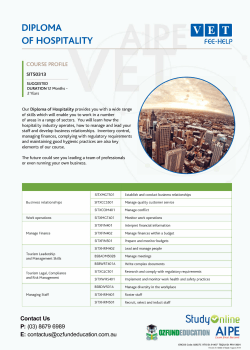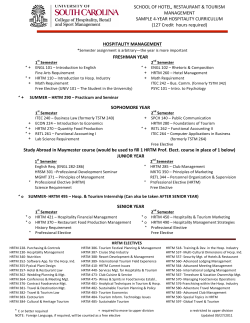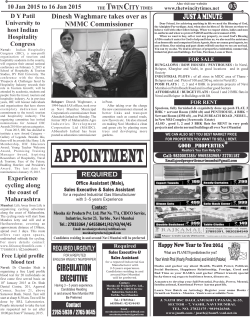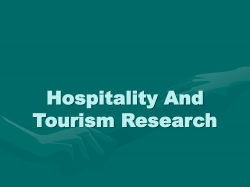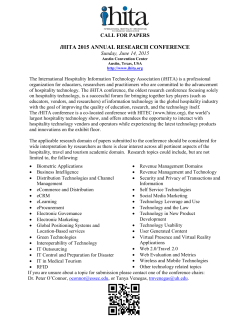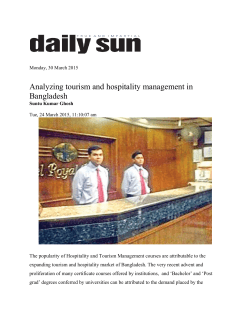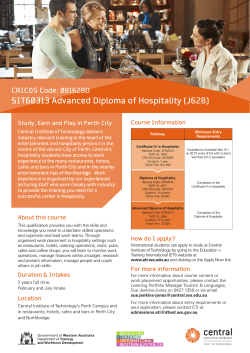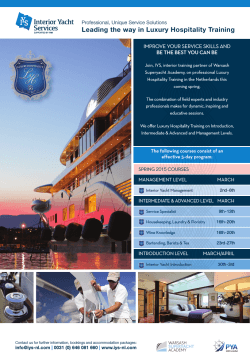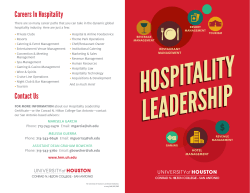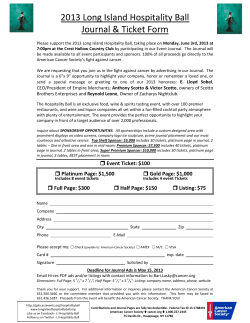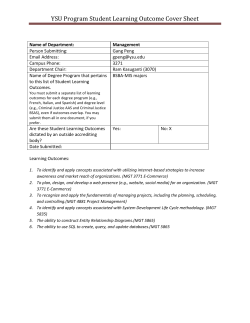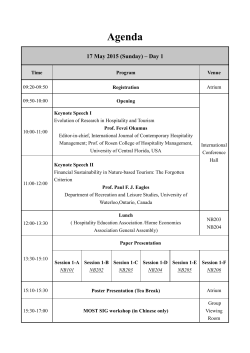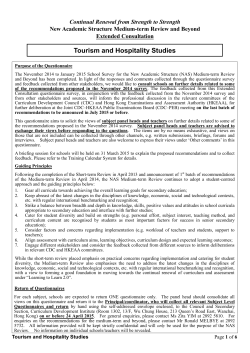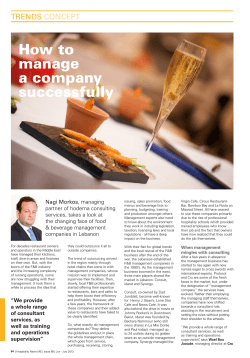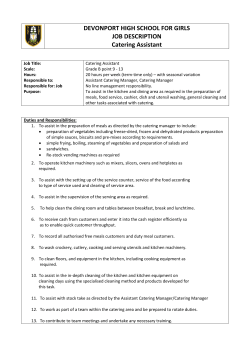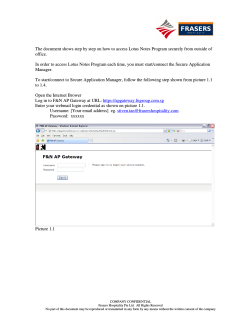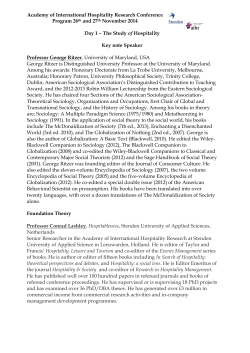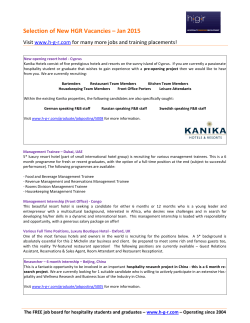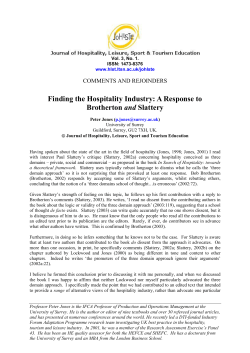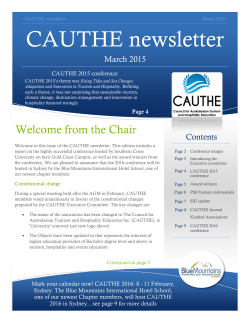
1 BHARATHIAR UNIVERSITY : COIMBATORE-641 046 M.B.A –HOSPITALITY MANAGEMENT AND CATERING SCIENCE
MBA(Hospitality Mgt and Catering Science) – CCII – 2014-15 onwards Page 1 of 3 Total 5 5 4 5 5 4 2 3 3 3 3 3 3 - 25 25 25 25 25 25 - 75 75 75 75 75 75 - 100 100 100 100 100 100 - 4 4 4 4 4 4 - 5 4 5 4 5 5 3 3 3 3 3 3 25 25 25 25 25 25 75 75 75 75 75 75 100 100 100 100 100 100 4 4 4 4 4 4 2 3 40 60 100 4 5 5 5 5 5 5 - 3 3 3 3 3 3 - 25 25 25 25 25 25 - 75 75 75 75 75 75 - 100 100 100 100 100 100 100* 4 4 4 4 4 4 4 6 6 6 6 6 3 3 3 3 3 25 25 25 25 25 75 75 75 75 75 100 100 100 100 100 2500 4 4 4 4 4 100 Credits Marks TOTAL CIA 4.5. Tourism Products Dur.Hrs SEMESTER –I 1.1. Management Principles and Practice 1.2. Organizational Behaviors 1.3. Managerial Economics 1.4. Financial and Management Accounting 1.5. Quantitative Methods for Management 1.6. Corporate Communication 1.7. **Fundamentals of Food Production & Nutrition SEMESTER –II 2.1. Operations Management 2.2. Marketing Management 2.3. Financial Management 2.4. Human Resource Management 2.5. Management Information System 2.6. Research Methods for Management 2.7. ** Fundamentals of Food Production & Nutrition - Practical SEMESTER – III 3.1. Business Ethics and Global Business Environment 3.2. FOOD AND BEVERAGE SERVICE & practicals 3.3. Hospitality Management 3.4. Tourism planning and marketing 3.5. Eco- Tourism 3.6. International Hospitality Law 3.7. Summer Placement Project Report & Viva-Voce SEMESTER – IV 4.1. Strategic Management : Indian Global Context 4.2. International Business 4.3. International tourism management 4.4. Tourism Business Environment Ins.hrs / week BHARATHIAR UNIVERSITY : COIMBATORE-641 046 CENTRE FOR COLLABORATION OF INDUSTRY AND INSTITUTION(CCII) M.B.A –HOSPITALITY MANAGEMENT AND CATERING SCIENCE (For the CCII students admitted from the academic year 2014-15 & onwards) SCHEME OF EXAMINATIONS – CBCS Pattern Course Title Examinations * * This course will be thought during I & II semesters *Project Report - 80% Marks; Viva-Voce -20% Marks Note: The syllabus for the papers Quantitative Methods for Management and Management Information System is furnished below. The syllabus for the remaining papers be the same as prescribed for the academic year 2013-14. MBA(Hospitality Mgt and Catering Science) – CCII – 2014-15 onwards Page 2 of 3 1.5. QUANTITATIVE METHODS FOR MANAGEMENT Objectives: To enable students to acquire the knowledge of mathematics & statistics and their use in business decision making. UNIT I Linear, Non-Linear functions – graphical representation of functions, Constants, Variables – notion of Mathematical models – concept of trade off – notion of constants – concept of Interest. Basic Concept of differentiation – integration – Optimization concepts – use of differentiation for optimization of business problem- Optimization UNIT II Data Analysis – Uni-Variate – ungrouped and grouped data measures of central Tendencies, measures of dispersion – C V percentages (problem related to business applications). Bivariate – correlation and regression – problems related to business applications UNIT III Probability – definitions – addition and multiplication Rules (only statements) – simple business application problems – probability distribution – expected value concept – theoretical probability distributions – Binomial, Poison and Normal – Simple problems applied to business. UNIT IV Mathematical Models – deterministic and probabilistic – simple business examples – OR and optimization models – Linear Programming – formulation – graphical solution –Dual of linear programming problem – Economic interpretation UNIT V Transportation model – Initial Basic Feasible solutions – optimum solution for non – degeneracy model – Trans-shipment Model – Assignment Model - Network Model – networking – CPM – critical path Reference Books : 1. Statistics for Management – Richard L Levin & Daid S Rubin 2. Statistical Methods – S P Gupta 3. Statistics for Business and Economics – R P Hoods – MacMillan India Limited 4. Operations Research – An Introductions – Hamdy A Tata 5. Operations Research – Kanti Swarup, Gupta And Man Mohan 6. Operations Research – Dr. J.K. Sharma Macmillan Indian Ltd. 7. Operations Research – R. Panneerselvam, 2nd Edition, PHI, 2007 Questions : 80% of the questions shall be problems 20% of the questions shall be theory based. MBA(Hospitality Mgt and Catering Science) – CCII – 2014-15 onwards Page 3 of 3 2.5. MANAGEMENT INFORMATION SYSTEM UNIT – I : Foundations of Information Systems: A framework for business users - Roles of Informationsystems - System concepts - Organisation as a system - Components of Information Systems - IS Activities - Types of IS. UNIT – II : IS for operations and decision making: Marketing IS, Manufacturing IS, Human Resource IS, Accounting IS and Financial IS - Transaction Processing SystemsInformation Reporting System - Information for Strategic Advantage. UNIT – III : DSS and AI: DSS models and software: The decision making process - Structured, Semi Structured and Unstrcutured problems; What if analysis, Sensitivity analysis, Goal-seeking Analysis and Optimizing Analysis. Oberview of AI, Neural Networks, Fuzzy Logic Systems, Genetic Algorithms - Expert Systems. UNIT – IV :Managing Information Technology: Managing Information Resources and technologies - IS architecture and management - Centralised, Decentralised and Distributed EDI, Supply chain management & Global Information technology Management. UNIT - V :Security and Ethical Challenges: IS controls - facility control and procedural control - Risks to online operations - Denial of service, spoofing - Ethics for IS professional - Societical challenges of Information technology. Reference: 1. James A O'Brien, "Management Information Systems", Tata McGraw Hill, Fourth Edition, 1999. 2. Effy Oz, "Management Information Systems", Vikas Publishing House, Third Edition, 2002. 3. Kenneth C Laudon and Jane P Laudon, “Management Information System”, 9th Edition, PHI, New Delhi, 2006. 4. Waman S Jawadekar , "Management Information System Text and cases", Third Editions, Tata McGraw-Hill ,2007. 5. R.Srinivasan, “Strategic Management”, IInd edition, Prentice Hall of India, New Delhi. 6. M.Senthil, “Management Information System”, 2003.
© Copyright 2025
